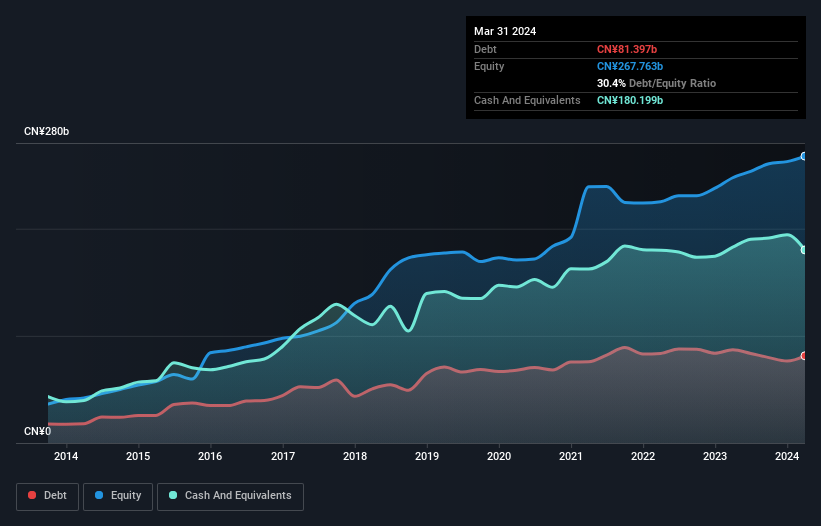- United States
- /
- Interactive Media and Services
- /
- NasdaqGS:BIDU
These 4 Measures Indicate That Baidu (NASDAQ:BIDU) Is Using Debt Safely

David Iben put it well when he said, 'Volatility is not a risk we care about. What we care about is avoiding the permanent loss of capital.' So it seems the smart money knows that debt - which is usually involved in bankruptcies - is a very important factor, when you assess how risky a company is. We note that Baidu, Inc. (NASDAQ:BIDU) does have debt on its balance sheet. But is this debt a concern to shareholders?
When Is Debt A Problem?
Debt assists a business until the business has trouble paying it off, either with new capital or with free cash flow. Ultimately, if the company can't fulfill its legal obligations to repay debt, shareholders could walk away with nothing. However, a more frequent (but still costly) occurrence is where a company must issue shares at bargain-basement prices, permanently diluting shareholders, just to shore up its balance sheet. Of course, the upside of debt is that it often represents cheap capital, especially when it replaces dilution in a company with the ability to reinvest at high rates of return. When we examine debt levels, we first consider both cash and debt levels, together.
See our latest analysis for Baidu
How Much Debt Does Baidu Carry?
The image below, which you can click on for greater detail, shows that Baidu had debt of CN¥81.4b at the end of March 2024, a reduction from CN¥87.0b over a year. But on the other hand it also has CN¥180.2b in cash, leading to a CN¥98.8b net cash position.

How Healthy Is Baidu's Balance Sheet?
According to the last reported balance sheet, Baidu had liabilities of CN¥77.9b due within 12 months, and liabilities of CN¥69.0b due beyond 12 months. Offsetting these obligations, it had cash of CN¥180.2b as well as receivables valued at CN¥12.1b due within 12 months. So it actually has CN¥45.4b more liquid assets than total liabilities.
This excess liquidity suggests that Baidu is taking a careful approach to debt. Due to its strong net asset position, it is not likely to face issues with its lenders. Succinctly put, Baidu boasts net cash, so it's fair to say it does not have a heavy debt load!
Another good sign is that Baidu has been able to increase its EBIT by 22% in twelve months, making it easier to pay down debt. The balance sheet is clearly the area to focus on when you are analysing debt. But it is future earnings, more than anything, that will determine Baidu's ability to maintain a healthy balance sheet going forward. So if you want to see what the professionals think, you might find this free report on analyst profit forecasts to be interesting.
But our final consideration is also important, because a company cannot pay debt with paper profits; it needs cold hard cash. While Baidu has net cash on its balance sheet, it's still worth taking a look at its ability to convert earnings before interest and tax (EBIT) to free cash flow, to help us understand how quickly it is building (or eroding) that cash balance. Happily for any shareholders, Baidu actually produced more free cash flow than EBIT over the last three years. There's nothing better than incoming cash when it comes to staying in your lenders' good graces.
Summing Up
While we empathize with investors who find debt concerning, you should keep in mind that Baidu has net cash of CN¥98.8b, as well as more liquid assets than liabilities. The cherry on top was that in converted 105% of that EBIT to free cash flow, bringing in CN¥25b. So is Baidu's debt a risk? It doesn't seem so to us. Over time, share prices tend to follow earnings per share, so if you're interested in Baidu, you may well want to click here to check an interactive graph of its earnings per share history.
If, after all that, you're more interested in a fast growing company with a rock-solid balance sheet, then check out our list of net cash growth stocks without delay.
Valuation is complex, but we're here to simplify it.
Discover if Baidu might be undervalued or overvalued with our detailed analysis, featuring fair value estimates, potential risks, dividends, insider trades, and its financial condition.
Access Free AnalysisHave feedback on this article? Concerned about the content? Get in touch with us directly. Alternatively, email editorial-team (at) simplywallst.com.
This article by Simply Wall St is general in nature. We provide commentary based on historical data and analyst forecasts only using an unbiased methodology and our articles are not intended to be financial advice. It does not constitute a recommendation to buy or sell any stock, and does not take account of your objectives, or your financial situation. We aim to bring you long-term focused analysis driven by fundamental data. Note that our analysis may not factor in the latest price-sensitive company announcements or qualitative material. Simply Wall St has no position in any stocks mentioned.
Have feedback on this article? Concerned about the content? Get in touch with us directly. Alternatively, email editorial-team@simplywallst.com
About NasdaqGS:BIDU
Baidu
Provides online marketing and non-marketing value added services through an internet platform in the People’s Republic of China.
Undervalued with solid track record.
Similar Companies
Market Insights
Community Narratives



